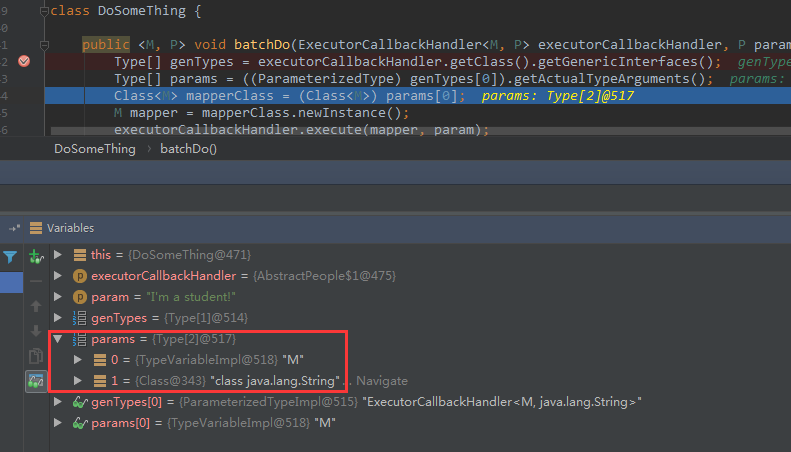Java类的泛型参数能作为另外一个泛型类的参数传入吗?
最近遇到一个棘手的泛型问题,精简化后,代码如下:
import java.lang.reflect.ParameterizedType;
import java.lang.reflect.Type;
public class testMain {
public static void main(String[] args) throws IllegalAccessException, InstantiationException {
People people = new People();
people.doIt("I'm a student!");
}
}
interface Say {
void say(String word);
}
class Student implements Say {
public void print(String say) {
System.out.println(say);
}
@Override
public void say(String word) {
print(word);
}
}
interface ExecutorCallbackHandler<M, P> {
void execute(M mapper, P param);
}
class DoSomeThing {
public <M, P> void batchDo(ExecutorCallbackHandler<M, P> executorCallbackHandler, P param) throws IllegalAccessException, InstantiationException {
Type[] genTypes = executorCallbackHandler.getClass().getGenericInterfaces();
Type[] params = ((ParameterizedType) genTypes[0]).getActualTypeArguments();
Class<M> mapperClass = (Class<M>) params[0];
M mapper = mapperClass.newInstance();
executorCallbackHandler.execute(mapper, param);
}
}
class AbstractPeople<M extends Say> {
private DoSomeThing doSomeThing = new DoSomeThing();
public void doIt(String param) throws InstantiationException, IllegalAccessException {
doSomeThing.batchDo(new ExecutorCallbackHandler<M, String>() {
@Override
public void execute(M people, String param) {
people.say(param);
}
}, param);
}
}
class People extends AbstractPeople<Student> {
}
泛型参数Student,经过AbstractPeople.doIt传入DoSomeThing.batchDo,但是解析时,泛型参数M并未解析成Student,导致出现异常。
请问,是什么原因,如何解决
DoSomeThing在new的时候 没指定泛型
ExecutorCallbackHandler 这个地方编译器 是不会判断正在执行的类型的,如果想把M当作参数传递,要老老实实的写在形参列表里面。
比如 new ExecutorCallbackHandler 的时候 传进去 一个 Clazz 这样。
public class testMain {
public static void main(String[] args) throws IllegalAccessException, InstantiationException {
People people = new People();
people.doIt("I'm a student!");
}
}
interface Say {
void say(String word);
}
class Student implements Say {
public void print(String say) {
System.out.println(say);
}
@Override
public void say(String word) {
print(word);
}
}
interface ExecutorCallbackHandler<M, P> {
void execute(M mapper, P param);
}
class DoSomeThing {
/*public <M, P> void batchDo(ExecutorCallbackHandler<M, P> executorCallbackHandler, P param) throws IllegalAccessException, InstantiationException {
Type[] genTypes = executorCallbackHandler.getClass().getGenericInterfaces();
Type[] params = ((ParameterizedType) genTypes[0]).getActualTypeArguments();
Class<M> mapperClass = (Class<M>) params[0];
M mapper = mapperClass.newInstance();
executorCallbackHandler.execute(mapper, param);
}*/
public <M, P> void batchDo(ExecutorCallbackHandler<M, P> executorCallbackHandler, P param, Class<M> clazz) throws IllegalAccessException, InstantiationException {
M mapper = (M) clazz.newInstance();
executorCallbackHandler.execute(mapper, param);
}
}
class AbstractPeople<M extends Say> {
private DoSomeThing doSomeThing = new DoSomeThing();
private Class<M> clazz;
public AbstractPeople(Class<M> clazz) {
this.clazz = clazz;
}
public void doIt(String param) throws InstantiationException, IllegalAccessException {
doSomeThing.batchDo(new ExecutorCallbackHandler<M, String>() {
@Override
public void execute(M people, String param) {
people.say(param);
}
}, param, clazz);
}
}
class People extends AbstractPeople<Student> {
public People() {
super(Student.class);
}
}
